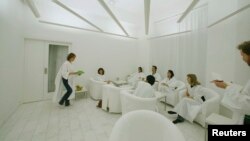From October through February, Umea, Sweden, 500 kilometers from the Arctic Circle, gets between 42 and 45 minutes of sunlight during the day. The rest of the time, it is pitch-black outside.
Studies have shown that many people develop a type of depression called seasonal affective disorder, or SAD, during the winter months because of the shortened hours of daylight. In Swedish communities blanketed by winter darkness, people, especially teenagers, become noticeably tired and lack energy, symptoms of SAD.
So executives at municipally owned Umea Energi decided to light things up for the 2,000 students in the local high school, Dragonskolan. Marketing director Agneta Filén said the company installed full-spectrum lamps to see whether exposing students to 45 minutes of simulated sunlight per day in the classroom improved their mood. The lights have also been installed in the school’s cafeteria.
“We really get affected [by] this lack of sun," she said. "And also, if you look at science, a lot of new studies are telling this is not only a feeling, this is true if you study the human body.”
Filén addsd that immigrants from Africa and the Middle East, who are used to a greater amount of direct sunlight, are especially prone to depression when they settle in Sweden.
The light therapy lamps have been up only since the beginning of December, and Filén is eager to see whether students become more alert and motivated.
“It would be interesting to see if these teenagers actually will have more energy in late February,” she said.
Studies show regular exposure to artificial sunlight can take a little while to ease seasonal depression.
Dragonskolan senior Rasmus Oberg, 18, said it has taken a little while to get used to the brightness of the lights, but he supports installation of the lamps.
"I think it's great to really try and put money and effort into making sure that students get what they need to be able finish the day," he said. " ... You often need, like, energy. You need sunlight to be able to function properly and educate yourself properly."
Three years ago, Umea Energi installed similar lamps in 26 bus stations, and riders seemed to like the addition.
The energy to power the 140 new lamps at the school was collected by the utility during the summer. Between June and August this year, there were a record 915 hours of sunlight in Umea.




